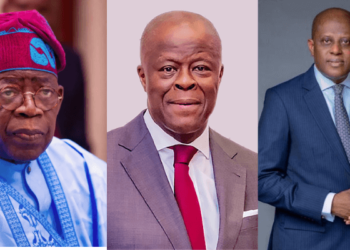Nigeria’s continued reliance on oil as a major foreign exchange earner as encapsulated in the current economic recovery and growth plan, (ERGP) despite her avowed commitment to diversification and the multiplicity of exchange rates, among others are making government at all levels becoming increasingly biggest threat to economy.
The current discordant tones among agencies of government such as the security report from Department of states security services (DSS) on the activities of another sister agency, Economic and Financial Crimes Commission (EFCC) and Ibrahim Magu, acting chairman and state governors’ huge debts to their workers while living lives of opulence are making the citizens to lose faith in governance.
Similarly, quantum of debts owed by its Ministries, Departments and Agencies (MDAs) to critical sectors of the economy is hampering smooth operations of some critical organisations like the Distribution Companies, (DisCos)
“The structure of the foreign exchange market is still a cause for concern. As the saying goes, “If the foundations be de-stroyed, what can the righteous do?” In this case, the fundamentals of the foreign exchange market remains flawed with multiple rates and segments. Export proceeds: N285/$; IFEM : N305.75/$; IATA : N306/$’ Invisibles : N375/$ BDC : N400/$ Parallel market: N463/$
Such segmentation in the market will always remain a threat to the stability of the market. Failing to address such an imminent threat means sustainability of the policy will be challenging to attain. Sooner or later the wound will fester and the market will collapse and the CBN will be left with no choice but to let the currency float into the sky.
The new forex policy is a short term makeshift solution to the issues pertaining to liquidity and confidence levels.
Until the rates across the segmented foreign exchange market converge to a unified rate, the market will always be on the verge of a collapse from speculative activities”, says Bismarck Rewane chief executive, Financial Derivatives Company in the Economic Bulletin of February 14, 2017.
“The confirmation screening of Magu, report from DSS and even his (Magu) response on the ‘integrity’ of DSS showed that government at the centre or the ‘kitchen cabinet’ is in disarray. What can you make out from two agencies that report to the president or presidency antangonising each other in the public? Will the unfolding drama help build confidence in our economy for investors to come?” a source who pleaded for anonymity said at the weekend.
John Donnachie, Managing Director and Chief Executive, Ibadan Electricity Distribution Company (IBEDC) recently said that MDAs indebtedness to the company stands at N8.2billion (post N4.5billion) as at December 2016
Donnachie, whose company supplies light to Oyo, Ogun, Osun, Kwara and parts of Niger, Ekiti and Kogi states said that for Nigeria to achieve greatness, the citizens must have to be empowered through adequate infrastructure such as power.
“Nigeria’s potential to become one of the largest economy in the world will continue to be a dream without a vibrant and stable power sector,” he said.
Friday Ameh, energy analyst said that government at all levels has not effectively positioned themselves as enablers for economic growth.
Ameh picked hole in some of the provisions of the ERGP wondering whether government is aware that we as a nation has an uncertain future based on growth projections or recovery on earnings from oil
“The just released ERGP 2017-2020 seems to suggest that the country is unaware that global energy politics has changed forever.
ERGP document claims that oil revenue will be used to ‘’develop and diversify the economy’’. This to me amounts to wishful thinking as a 2.5 million barrel per day oil output cannot sustain the consumptive lifestyle of 180 million people, who depend on it for its entire forex earning, not to speak of being enough to fund infrastructural development, which would spur growth in other sectors.
Part of our problems have been that almost all the nation’s earnings from oil is spent on recurrent expenditure, leaving borrowed funds for investments in capital projects.
“I see the threat to the economy coming more from within and which is making investors to continue to lose confidence in our economy.”
Nigeria Deposit Insurance Corporation (NDIC) recently made a revelation that of the total loans portfolio of N18.53 trillion as at December 2016, N1.85 trillion, about 10 percent represents NPLs, while 40 percent of the NPLs is insider related dealings.
“This is frightening! This is an indictment on their regulators as well as the corporate governance of Nigerian banks. This calls for urgent and close examination of the credit approval process of the banks. In addition, loans and advances to related parties which is disclosed may require further fine tuning to ring fence shareholders’ funds against misappropriation. With the available NPLs data from NDIC, it may send further worries into the mind of investors who are reeling from the ailing economy, thus triggering additional sell down in banking shares.” Says Ayodeji Ebo, acting managing director, Afrinvest securities limited.
Ameh believes that the revelations show the level of abdication of responsibilities by the regulators who are supposed to monitor their activities and to ensure that confidence in the sector, regarded as one of the major drivers of the economy continues to rise










